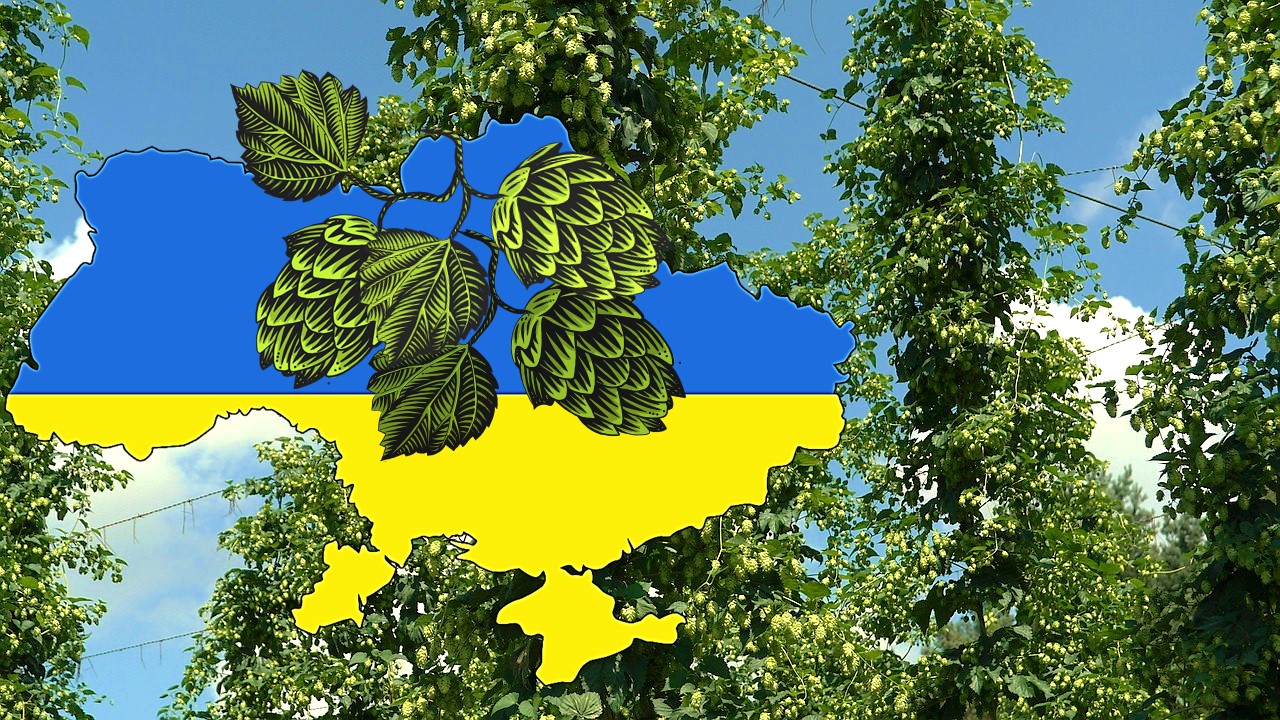Variability and stability of essential oil composition in Ukrainian hop varieties
DOI:
https://doi.org/10.18832/kp2023.69.811Keywords:
essential oil of hops, varieties of hops, variability, stability, biochemical criteriaAbstract
The aim of the study was to evaluate the variation in essential oil content and composition within nine distinct Ukrainian hop varieties, with a particular focus on their genetic stability and suitability for brewing applications over 11 years of their cultivation. The hydrodistillation method (Analytica-EBC 7.10) was used to evaluate hop essential oil content and gas-liquid capillary chromatography (Analytica-EBC 7.12) to discern its qualitative composition. Variability was evaluated using statistical parameters. The essential oil content across the studied varieties spanned from 0.51 to 2.58 ml/100 g of dry hop cones. The highest content was measured in the bitter-aroma variety with a special aroma – Ruslan. The predominant essential oil components, including myrcene, caryophyllene, humulene, and farnesene, collectively constituted 70.0–84.2% of the total amount. The aroma varieties displayed myrcene content typical for European varieties (with the level up to 56.2% in the Ruslan variety). Farnesene content exhibited significant variation ranging from 0.3 to 17.6% with the highest content in Saaz-type varieties (Klon 18, Zlato Polissya, and National) and the bitter type Promin variety. Humulene content ranged from 13.2 to 32.6%. Among all studied varieties, Alta displayed the least variability for all parameters evaluated (Cv = 15.2%). This study underscores the genetic basis of essential oil composition in hops, emphasizing its potential as a biochemical criterion for identifying hop breeding varieties. The study revealed, that despite annual fluctuations, the essential oil content and composition remained within passport data declared for the variety. The findings provide valuable insight into a sustainable cultivation and optimal utilization of hops in the brewing industry.
References
Afonso, S., Arrobas, M., Rodrigues, Ângelo, M. (2021). Agronomic and chemical evaluation of hop cultivars grown under Mediterranean conditions. Spanish Journal of Agricultural Research, 19(3), e0904. https://doi.org/10.5424/sjar/2021193-17528
Analytica-EBC, 7.10 (2018). Hop Oil Content of Hops and Hop Products. https://brewup.eu/ebc-analytica/hops-and-hop-products/hop-oil-content-of-hops-and-hop-products/7.10
Analytica-EBC, 7.12 (2018). Hop Essential Oils by Capillary Gas Chromatography Flame Ionization Detection. https://brewup.eu/ebc-analytica/hops-and-hop-products/hop-essential-oils-by-capillary-gas-chromatography-flame-ionization-detection/7.12
Aydin, T., Bayrak, N., Baran, E., Cakir, A. (2017). Insecticidal effects of extracts of Humulus lupulus (hops) L. cones and its principal component, xanthohumol. Bulletin of Entomological Research, 107(4), 543–549. https://doi.org/10.1017/S0007485317000256
Bedini, S., Flamini, G., Cosci, F., Ascrizzi, R., Benelli, G., Conti, B. (2016). Cannabis sativa and Humulus lupulus essential oils as novel control tools against the invasive mosquito Aedes albopictus and fresh water snail Physella acuta. Industrial Crops and Products, 85, 318–323. https://doi.org/10.1016/j.indcrop.2016.03.008
Blyznyuchenko, O. (2003). Biometrics. Poltava: Editorial and publishing department "Terra" of the Poltava State Agrarian Academy, 346 p. ISBN 966-7749-01-0
Bober, A., Liashenko, M., Protsenko, L., Slobodyanyuk, N., Matseiko, L., Yashchuk, N., Gunko, S., Mushtruk, M. (2020). Biochemical composition of the hops and quality of the finished beer. Potravinarstvo Slovak Journal of Food Sciences, 14, 307–317. https://doi.org/10.5219/1311
Bocquet, L., Sahpaz, S., Hilbert, J., Rambaud, C., Rivière, C. (2018a). Humulus lupulus L., a very popular beer ingredient and medicinal plant: Overview of its phytochemistry, its bioactivity, and its biotechnology. Phytochemistry Reviews, 17, 1047–1090. https://doi.org/10.1007/s11101-018-9584-y
Bocquet, L., Rivière, C., Dermont, C., Samaillie, J., Hilbert, J.-L., Halama, P., Siah, A., Sahpaz, S. (2018b). Antifungal activity of hop extracts and compounds against the wheat pathogen Zymoseptoria tritici. Industrial Crops and Products, 122, 290–297. https://doi.org/10.1016/j.indcrop.2018.05.061
Carbone, K., Bianchi, G., Petrozziello, M., Bonello, F., Macchioni, V., Parisse, B., De Natale, F., Alilla, R., Cravero, M. (2021). Tasting the Italian Terroir through Craft Beer: Quality and Sensory Assessment of Cascade Hops Grown in Central Italy and Derived Monovarietal Beers. Foods, 10(9), 2085. https://doi.org/10.3390/foods10092085
DeGrandi-Hoffman, G., Ahumada, F., Probasco, G., Schantz, L. (2012). The effects of beta acids from hops (Humulus lupulus) on mortality of Varroa destructor (Acari: Varroidae). Experimental and Applied Acarology, 58, 407–421. https://doi.org/10.1007/s10493-012-9593-2
Donadini, G., Porretta, S. (2017). Uncovering patterns of consumers' interest for beer: A case study with craft beers. Food Research International, 91, 183–198. https://doi.org/10.1016/j.foodres.2016.11.043
Hauser, D., Lafontaine, S., Shellhammer, Th. (2019). Extraction Efficiency of Dry-Hopping, Journal of the American Society of Brewing Chemists, 77(3), 188-198. https://doi.org/10.1080/03610470.2019.1617622
Hrnčič, M., Španinger, E., Košir, I., Knez, Ž., Bren, U. (2019). Hop Compounds: Extraction Techniques, Chemical Analyses, Antioxidative, Antimicrobial, and Anticarcinogenic Effects. Nutrients, 11(2), 257. https://doi.org/10.3390/nu11020257
Humia, B., Santos, K., Barbosa, A., Sawata, M., Mendonça, M., Padilha, F. (2019). Beer Molecules and Its Sensory and Biological Properties: A Review. Molecules. 24(8), 1568. https://doi.org/10.3390/molecules24081568
Iannone, M., Ovidi, E., Vitalini, S., Masci, V., Marianelli, A., Iriti, M., Tiezzi, A., Garzoli, S. (2022). From Hops to Craft Beers: Production Process, VOCs Profile Characterization, Total Polyphenol and Flavonoid Content Determination and Antioxidant Activity Evaluation. Processes, 10(3), 517. https://doi.org/10.3390/pr10030517
Isman, M.B. (2006). Botanical insecticides, deterrents, and repellents in modern agriculture and an increasingly regulated world. Annual Review of Entomology, 51, 45–66. https://doi.org/10.1146/annurev.ento.51.110104.151146
Jirovetz, L., Bail, S., Buchbauer, G., Denkova, Z., Slavchev, A., Stoyanova, A., Schmidt, E., Geissler, M. (2006). Antimicrobial testings, gas chromatographic analysis and olfactory evaluation of an essential oil of hop cones (Humulus lupulus L.) from Bavaria and some of its main compounds. Scientia Pharmaceutica, 74, 189–201. https://doi.org/10.3797/scipharm.2006.74.189
Karabín, M., Hudcová, T., Jelínek, L., Dostálek, P. (2016). Biologically Active Compounds from Hops and Prospects for Their Use. Comprehensive Reviews in Food Science and Food Safety, 15(3), 542–567. https://doi.org/10.1111/1541-4337.12201
Kovalev, V., Kozlik, T., Protsenko, L., Bober, A., Kormiltsev, B. (2020). Extending and maintaining the in vitro collection of (inter)national hop varieties in Ukraine. Agricultural Science and Practice, 7(3), 61–71. https://doi.org/10.15407/agrisp7.03.061
Krofta, K., Klapal, I., Vojtěchová, D., Ondráček, J., Kroupa, F., Tichá, J. (2019). Hodnocení kvalitativních parametrů českých chmelů ze sklizně 2018 (eng. Evaluation of qualitative parameters of Czech hops from the harvest of 2018). Chmelařství, 92(1–2), 2–11. Available only in Czech. ISSN 0373-403X
Lamberti, L., Grillo, G., Gallina, L., Carnaroglio, D., Chemat, F., Cravotto, G. (2021). Microwave-Assisted Hydrodistillation of Hop (Humulus lupulus L.) Terpenes: A Pilot-Scale Study. Foods, 10, 2726. https://doi.org/10.3390/foods10112726
Machado, Jr J., Faria, M., Ferreira, I. (2019). 10-Hops: New Perspectives for an Old Beer Ingredient. Natural Beverages, 13: The Science of Beverages, 267-301. https://doi.org/10.1016/B978-0-12-816689-5.00010-9
Nance, M., Setzer, W. (2011). Volatile components of aroma hops (Humulus lupulus L.) commonly used in beer brewing. Journal of Brewing and Distilling, 2(2), 16–22. https://doi.org/10.5897/JBD.9000010
Nesvadba, V., Polončíková, Z., Henychová, A., Krofta, K., Patzak, J. (2012). Atlas of Czech hop varieties. Chmelařský institut s.r.o., Žatec. ISBN978-80-87357-11-8 Available from: http://invenio.nusl.cz/record/161364/files/nusl-161364_1.pdf
Nesvadba, V., Charvátová, J., Trnková, S. (2020). Breeding of flavour hops in the Czech Republic. Kvasny prumysl, 66(6), 366–371. https://doi.org/10.18832/kp2019.66.366
Nesvadba, V., Olšovská, J., Straková, L., Charvátová, J., Trnková, S. (2021). Essential oils in Czech hop varieties. Kvasny prumysl, 67(3), 447-454. https://doi.org/10.18832/kp2021.67.447
Olšovská, J., Krofta, K., Jandovská, V., Patzak J., Štěrba, K. (2016). Methods for verifying the authenticity of hops – an effective tool against falsification. Kvasny prumysl, 62(10), 294–305. https://doi.org/10.18832/kp2016030
Pavela, R., Benelli, G. (2016). Essential Oils as Ecofriendly Biopesticides? Challenges and Constraints. Trends in Plant Science, 21(12),1000-1007. https://doi.org/10.1016/j.tplants.2016.10.005
Paventi, G., de Acutis, L., de Cristofaro, A., Pistillo, M., Germinara, G., Rotundo G. (2020). Biological Activity of Humulus lupulus (L.) Essential Oil and Its Main Components against Sitophilus granaries (L.) Biomolecules 10(8), 1108. https://doi.org/10.3390/biom10081108
Protsenko, L., Ryzhuk, S., Liashenko, M., Shevchenko, O., Litvynchuk, S., Yanse, L., Milosta, H. (2020). Influence of alpha acids hop homologues of bitter and aromatic varieties on beer quality. Ukrainian food journal, 9(2), 425–436. doi: 10.24263/2304-974X-2020-9-2-13
Rettberg, N., Biendl, M., Garbe, L.–A. (2018). Hop Aroma and Hoppy Beer Flavor: Chemical Backgrounds and Analytical Tools – A Review. Journal of the American Society of Brewing Chemists, 76(1), 1–20. https://doi.org/10.1080/03610470.2017.1402574
Rutnik, K., Hrnčič, M., Košir, I. (2022a). Hop Essential Oil: Chemical Composition, Extraction, Analysis, and Applications. Food Reviews International, 38(1), 529-551. https://doi.org/10.1080/87559129.2021.1874413
Rutnik, K., Ocvirk, M., Košir, I. (2022b). Changes in Hop (Humulus lupulus L.) Oil Content and Composition during Long-Term Storage under Different Conditions. Foods, 11, 3089. https://doi.org/10.3390/foods11193089
Salanță, L., Coldea, T., Ignat, M., Pop, C., Tofană, M., Mudura, E, Borșa, A., Pasqualone, A., Anjos, O., Zhao, H. (2020). Functionality of Special Beer Processes and Potential Health Benefits. Processes, 8(12), 1613. https://doi.org/10.3390/pr8121613
Ting, P., Ryder, D. (2017). The Bitter, Twisted Truth of the Hop: 50 Years of Hop Chemistry. Journal of the American Society of Brewing Chemists, 75(3), 161–180. https://doi.org/10.1094/ASBCJ-2017-3638-01

Downloads
Published
How to Cite
Issue
Section
License
Copyright (c) 2023 Anatolii Bober, Lidia Protsenko, Liliya Janse, Nina Koshytska, Serhii Ryzhuk, Mykola Liashenko, Sergiy Gunko

This work is licensed under a Creative Commons Attribution 4.0 International License.







